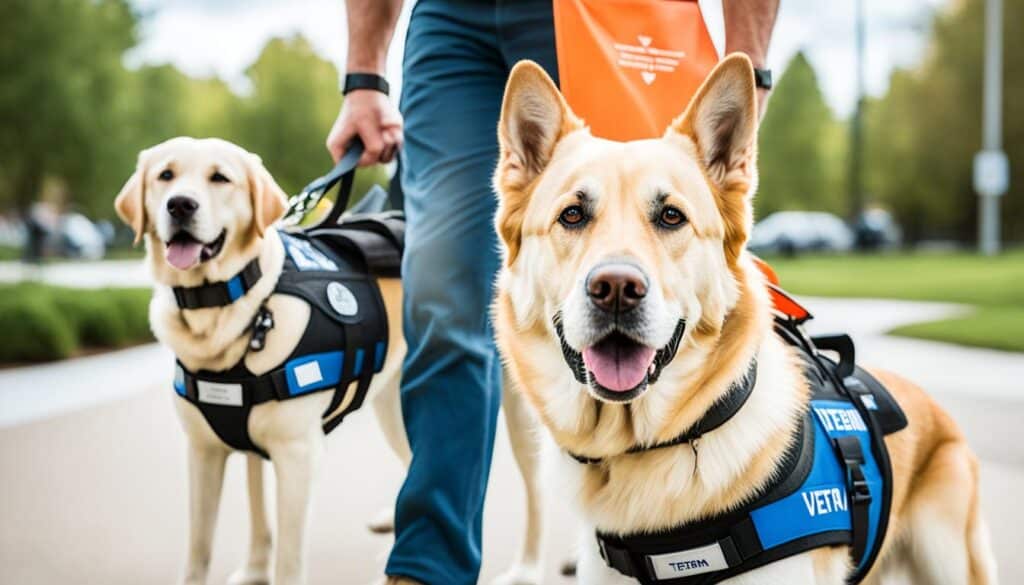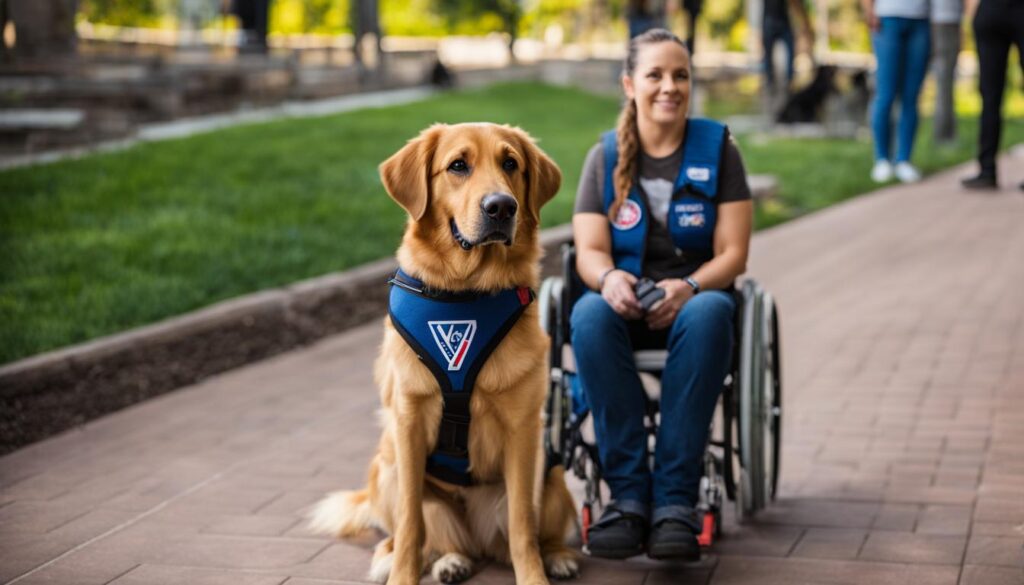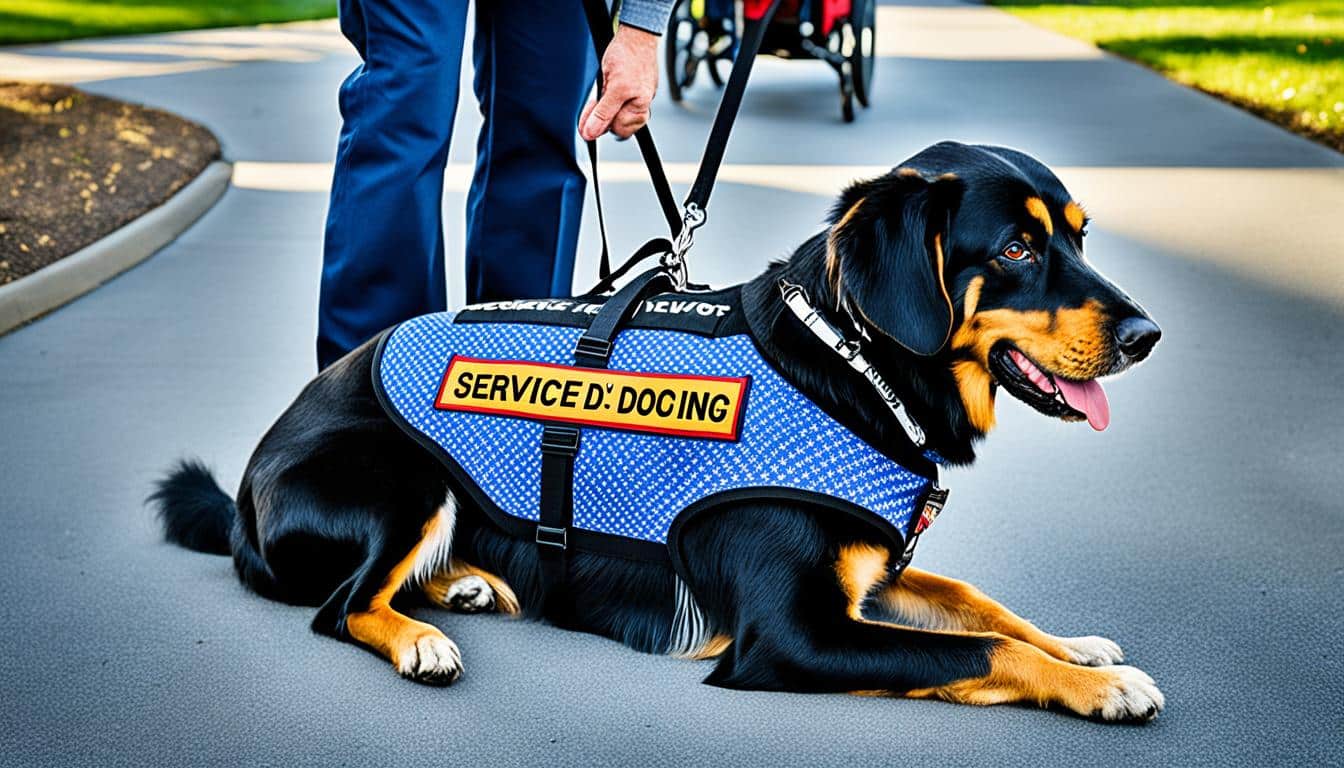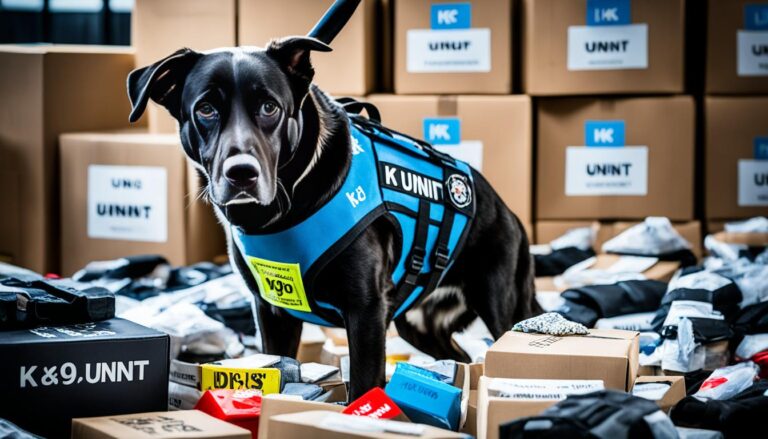Does the VA Pay for Service Dog Training?
Imagine the immense comfort and unwavering loyalty of a four-legged companion by your side, supporting you every step of the way through life’s challenges. For many veterans, this seemingly unbreakable bond with a service dog plays a vital role in their journey towards healing and independence. However, the question remains: does the VA provide financial assistance for service dog training?
As a veteran, you may have wondered about the options available to you and the potential costs associated with obtaining and training a service dog. In this article, we will delve into the details and provide you with a comprehensive understanding of the VA’s role in service dog training and the financial assistance they offer. Let’s explore the possibilities together, empowering you to make informed decisions and embrace the support you deserve.
What are Service Dogs?
Service dogs are specially trained guide or service dogs that are prescribed to disabled veterans to assist with visual, hearing, or substantial mobility impairments. These dogs have undergone comprehensive training programs provided by organizations accredited by Assistance Dogs International or the International Guide Dog Federation.
Service dogs are different from animal-assisted therapy or animal-assisted activity dogs, which are utilized in medical settings to support therapists or engage patients in various activities.
Service dogs play a vital role in aiding disabled veterans, providing them with increased independence, mobility, and assistance in their daily lives.
How can a Veteran Apply for VA Veterinary Health Benefits?
If you’re a veteran in need of a service dog, applying for VA veterinary health benefits is a crucial step in the process. To get started, schedule an appointment with your VA Clinical Care Provider or VA Mental Health Provider, depending on your specific disability. During this evaluation, the specialist will assess your condition and determine if a service dog is the right tool for your rehabilitation and treatment plan.
If a service dog is recommended, your provider will guide you through the application process. They will work with you to gather all the necessary information and documents required to request the benefit. The application is submitted through your local VA Medical Center’s Prosthetic and Sensory Aids Service.
Once your application is submitted, your case will be reviewed and evaluated by a prescribing clinician. They will assess your ability and means to care for the dog, as well as the goals you aim to accomplish through the use of the dog.
Applying for VA veterinary health benefits is a significant step towards obtaining a service dog and improving your quality of life. The VA is committed to supporting veterans in their journey towards optimal care and rehabilitation.
Follow these steps to apply for VA veterinary health benefits:
- Schedule an appointment with your VA Clinical Care Provider or VA Mental Health Provider.
- Undergo evaluation and assessment to determine if a service dog is suitable for your rehabilitation and treatment plan.
- Work with your provider to gather all necessary information and documents for the application.
- Submit your application through your local VA Medical Center’s Prosthetic and Sensory Aids Service.
- Have your case reviewed and evaluated by a prescribing clinician.
By following these steps, you’ll be one step closer to receiving the benefits and support you need for your service dog.
What Benefits does VA Provide?
VA provides certain benefits for service dogs prescribed to veterans. These benefits include a commercially available insurance policy that covers treatment and associated prescription medications deemed medically necessary by an accredited veterinarian. The policy also covers hardware or repairs/replacements for hardware required by the dog to perform tasks related to the veteran’s impairment. Additionally, VA may provide travel expenses associated with obtaining a service dog, as well as payment for travel expenses related to obtaining a replacement service dog. However, VA does not cover the cost of the dog itself, boarding, grooming, food, or other routine expenses. The dog remains the property of the veteran, and VA will not assume responsibility for or take possession of any service dog.
Benefits provided by the VA for service dogs include:
- Commercially available insurance policy for treatment and prescription medications
- Coverage for hardware or repairs/replacements required by the dog
- Financial assistance for travel expenses related to obtaining a service dog or replacement
However, it’s important to note that the VA does not cover the initial cost of the dog, as well as routine expenses such as boarding, grooming, and food. The veteran remains responsible for the ongoing care and maintenance of the service dog.
Types of Service Dogs
When it comes to service dogs for veterans, there are various types available to assist with specific needs and disabilities. These highly trained dogs play a crucial role in improving the lives of veterans by providing invaluable support and assistance.
Guide dogs for the blind
- Guide dogs are specifically trained to provide mobility assistance and guidance to individuals who are blind or visually impaired.
Hearing dogs for the deaf or hearing impaired
- Hearing dogs are trained to alert individuals who are deaf or hearing impaired to important sounds and noises in their environment.
Mobility assistance dogs
- Mobility assistance dogs are trained to assist individuals in wheelchairs or with mobility limitations, providing support and helping with tasks such as retrieving items and opening doors.
Seizure response dogs
- Seizure response dogs are trained to detect and respond to seizures, providing comfort, alerting others, and retrieving help when needed.
Diabetes assistance dogs
- Diabetes assistance dogs are specifically trained to detect blood sugar highs and lows, alerting individuals with diabetes to potential issues and helping them manage their condition.
Mental health service dogs
- Mental health service dogs are trained to assist individuals with mental health conditions such as PTSD, panic disorders, anxiety disorders, depression, and autism spectrum disorders. These dogs provide comfort, support, and can perform tasks to mitigate symptoms and improve overall well-being.
Eligibility for a service dog is determined through a comprehensive evaluation and assessment by a prescribing clinician. The specific type of service dog prescribed depends on the individual veteran’s needs and disabilities.

Rights and Restrictions for Service Dogs
Service dogs provide invaluable support to individuals with disabilities, and it’s important to understand their rights and the restrictions placed on them. Under the Americans with Disabilities Act (ADA), service dogs are granted certain privileges in order to assist their handlers in navigating public spaces.
Service dogs have the right to enter various public establishments, including food service establishments, state and local government facilities, and nonprofit organizations that serve the public. These establishments are legally obligated to allow service dogs and their handlers to access their premises.
It is crucial for service dogs to be under control at all times, typically through leashing or harnessing. This ensures both the safety of the dog and those around them. While service dogs are trained to behave appropriately in public, it is the responsibility of the handler to ensure their dog’s behavior remains in accordance with public etiquette.
When it comes to interacting with business staff, they are limited to asking just two questions to the handler of a service dog: whether the dog is a service animal and what specific tasks the dog has been trained to perform. However, staff members are not permitted to ask for documentation or specific details regarding the handler’s disability.
Importantly, service dogs cannot be charged extra fees or denied access to public establishments. They are afforded the same rights as any individual and should not face discrimination based on their status as a service dog.
In terms of financial considerations, the VA may provide reimbursement for certain expenses associated with service dogs, such as veterinary care and equipment. This reimbursement can help alleviate the financial burden of caring for a service dog, ensuring that veterans can provide the necessary care and support for their loyal companions.
Summary:
- Service dogs are protected by the ADA and have the right to enter public establishments.
- Service dogs must be under control at all times and should exhibit appropriate behavior in public.
- Business staff can only ask limited questions about the service dog’s status and tasks.
- Service dogs cannot be charged extra fees or denied access to public spaces.
- VA may provide reimbursement for certain expenses related to service dogs, such as veterinary care and equipment.
Can Your Dog Be a Service Dog?
While many people wish to have their pets trained as service dogs, proper training and qualification are necessary. Service dogs undergo rigorous training programs and are specifically trained to assist individuals with disabilities. Reputable trainers and organizations accredited by Assistance Dogs International can aid in preparing an animal for service work.
However, not all dogs are suitable to be trained as service dogs. The cost of training can be expensive, and personal dogs may not be considered for training by certain trainers. There is no official service dog certification from the VA, and online registries offering registration for a fee are not recognized or endorsed by the VA.

If you are considering training your dog as a service dog, it is important to work with a reputable trainer who understands the specific requirements and training protocols for service dogs. They can evaluate your dog’s temperament, health, and suitability for service work. Keep in mind that the training process can be lengthy and intensive.
Additionally, it is crucial to be aware of the VA’s guidelines and regulations regarding service dogs. While the VA provides certain benefits for service dogs prescribed to veterans, there is no guarantee that your personal dog will qualify for these benefits.
It is always recommended to consult with professionals in the field and gather as much information as possible before making any decisions regarding service dog training. They can guide you through the process and provide the necessary support and expertise.
Service Dogs and VA Benefits
As a veteran, you may be wondering about the benefits provided by the VA for service dog ownership. While the VA does not cover the cost of the dog itself or routine expenses, certain aspects of service dog ownership may be eligible for coverage.
If you have chronic mobility issues associated with a mental health disorder, you may qualify for VA benefits that include veterinary care, travel support, specialized equipment, and other costs related to caring for your service dog. These benefits are provided through the VA Prosthetic & Sensory Aids Service, ensuring that you can receive the necessary support for your service dog’s well-being.
While the VA does offer assistance with service dog-related expenses, it’s important to note that they do not fund the purchase or routine care of the dog. However, they recognize the valuable role that service dogs play in improving the lives of veterans and provide coverage for necessary services and equipment.
- Veterinary care: The VA can assist with covering the cost of veterinary care for your service dog, ensuring that they receive necessary medical treatment.
- Travel support: If you need to travel with your service dog for medical or therapeutic purposes, the VA may provide assistance with travel expenses.
- Specialized equipment: The VA recognizes that service dogs may require specialized equipment to perform their tasks effectively. They may cover the cost of equipment such as harnesses, leashes, and other necessary gear.
- Other related costs: The VA may also provide financial support for other costs directly related to caring for your service dog, such as grooming or training expenses.
It’s important to familiarize yourself with the specific guidelines and requirements for accessing VA benefits for service dogs. Contact your local VA Medical Center or speak with a VA representative to discuss your eligibility and the necessary steps to apply for these benefits.
Lesser-Known VA Benefits
While many veterans are aware of the VA’s service dog benefits, there are several other lesser-known benefits that can greatly improve the lives of veterans. In addition to the benefits provided for service dogs, the VA offers additional financial assistance and support in various aspects of their lives.
Home Loan Refinancing Options
If you’re a veteran looking to refinance your home, the VA offers home loan refinancing options that can help you save money and lower your monthly payments. These programs are designed to make homeownership more affordable and accessible for veterans.
Employment Resources
The VA provides employment resources to help veterans transition to civilian life and find meaningful employment opportunities. These resources include job training programs, resume assistance, job placement services, and access to job fairs and networking events.
Financial Assistance and Support
In addition to service dog benefits, the VA offers financial assistance and support to veterans in various aspects of their lives. This can include assistance with medical expenses, housing support, educational benefits, and more. By taking advantage of these benefits, veterans can receive the financial assistance they need to improve their quality of life and achieve their goals.
Overall, it’s important for veterans to be aware of the full range of benefits and support that the VA provides. Whether it’s obtaining a service dog, refinancing a home, or finding employment, these benefits can make a significant difference in the lives of veterans.
Assistance Dogs and Other Service Animals
While service dogs are the most common type of service animals, there are other animal species that can also be trained to assist individuals with disabilities. These include pigs, cats, horses, monkeys, and birds.
Emotional support animals and therapy animals have also gained popularity in providing companionship and support to veterans.
However, it is important to understand the differences between service animals, therapy animals, and emotional support animals in terms of their legal rights and access protections.
Types of Assistance Animals:
- Service Animals: These animals are specifically trained to perform tasks that help individuals with disabilities. They are protected by the Americans with Disabilities Act (ADA) and have certain rights to access public places.
- Therapy Animals: These animals are trained to provide comfort and emotional support to individuals in various settings, such as hospitals or nursing homes. They do not have the same legal rights as service animals.
- Emotional Support Animals: These animals provide emotional support to individuals with mental health conditions. While they may offer therapeutic benefits, they do not have the same legal rights as service animals.
It’s important to consult with the appropriate authorities and understand the regulations regarding each type of assistance animal.
DAV and Service/Assistance Animals
The Disabled American Veterans (DAV) Charitable Service Trust is dedicated to supporting programs related to service dogs and other types of service animals. These programs aim to improve the lives of ill and injured veterans through various animal-assisted interventions.
Service Dogs for Veterans Program: The DAV provides trained service dogs to veterans who are facing physical, mental, or emotional challenges. These service dogs are specifically trained to assist with tasks and provide support tailored to the individual needs of the veterans.
Equine-Assisted Therapy: The DAV also supports equine-assisted therapy programs for military personnel and veterans. Interacting with horses and engaging in therapeutic activities can have a positive impact on physical and emotional well-being.
Scholarships for Therapeutic Dolphin-Assisted Services: In recognition of the therapeutic benefits of interacting with dolphins, the DAV offers scholarships that enable veterans to access dolphin-assisted therapy. These programs have shown to be beneficial for physical and emotional rehabilitation.
The DAV understands the significance of service and assistance animals in assisting veterans on their journey of recovery. Through their support and grants, the DAV strives to make these valuable resources accessible to veterans in need.
Additional Resources
If you’re looking for more information on service dogs and assistance animals, Assistance Dogs International and the International Guide Dog Federation are valuable resources. These organizations accredit training groups and provide a wealth of information about service and guide dogs. Whether you’re a veteran seeking assistance or someone interested in learning more about these amazing animals, Assistance Dogs International and the International Guide Dog Federation can help.
Please note that the links provided will direct you to external websites. The VA does not endorse or assume responsibility for the content found on these sites. However, they are reputable sources that can provide further insight and guidance for those seeking information on service dogs and assistance animals.
Assistance Dogs International and the International Guide Dog Federation are dedicated to improving the lives of individuals with disabilities through the use of service dogs. Their expertise and resources can help you navigate the world of service dogs and understand the training and accreditation process. Whether you’re a veteran, a prospective service dog owner, or simply curious about these remarkable animals, Assistance Dogs International and the International Guide Dog Federation can be your trusted guides.






